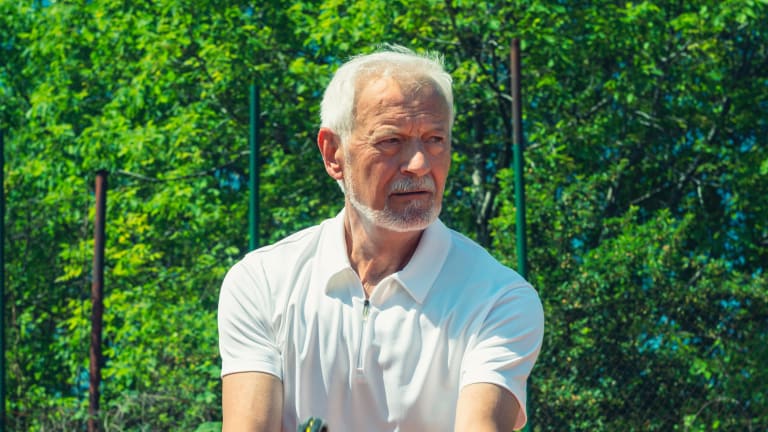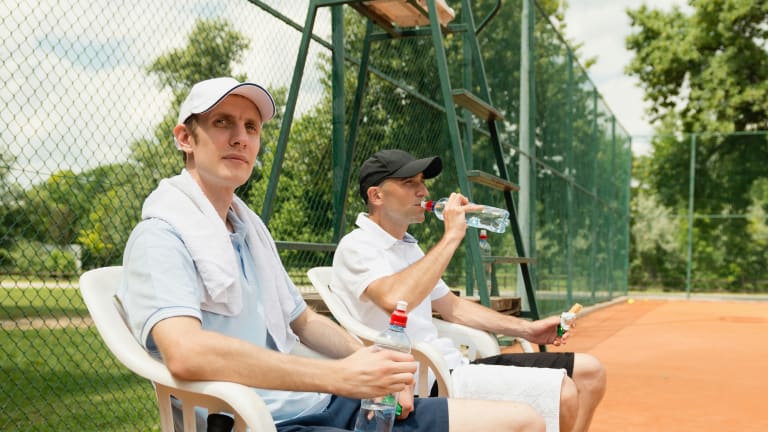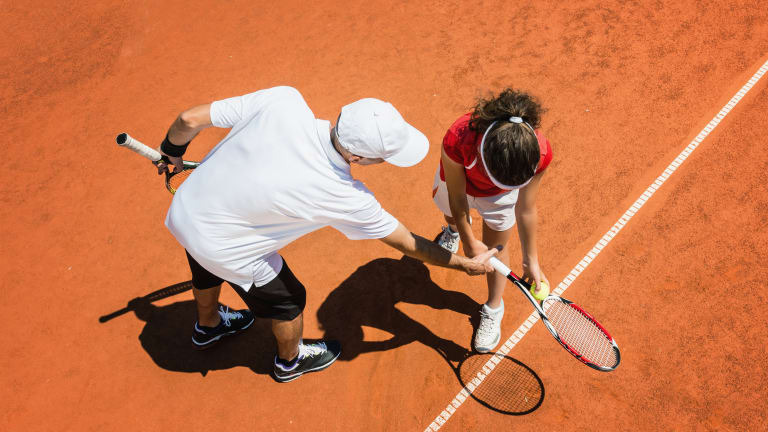The Game of Life
By Steve Tignor Apr 11, 2019Alexandra Eala vs. Iga Swiatek: Where to Watch, Madrid Preview, Betting Odds
By TENNIS.com Apr 23, 2025Lithuanian-born, Spanish-trained Vilius Gaubas is ready to take on the world
By Florian Heer Apr 23, 2025Joao Fonseca vs. Elmer Moller: Where to Watch, Madrid Preview, Betting Odds
By TENNIS.com Apr 23, 2025Learner Tien vs. Marcos Giron: Where to Watch, Madrid Preview, Betting Odds
By TENNIS.com Apr 23, 2025WATCH: Denis Shapovalov is still not over Diego Dedura’s over-the-top celebration
By Baseline Staff Apr 23, 2025Andre Agassi will play at US Open Pickleball Championships
By Associated Press Apr 22, 2025Stefanos Tsitsipas and Paula Badosa joke about a “white wedding” on the red carpet
By Liya Davidov Apr 22, 2025Elmer Moller, 21-year-old from Denmark, beat three of top four seeds to win Oeiras Open
By Florian Heer Apr 22, 2025Aryna Sabalenka keeps growing ranking points lead at No. 1 after reaching fifth final of year
By John Berkok Apr 22, 2025The Game of Life
In two recent studies, tennis players were shown to live longer lives than people who played any other sport. How can the game use that to its advantage?
Published Apr 11, 2019
Advertising
Bill Lipton liked what he saw when he opened his New York Times one morning last fall. Lipton turned 50 in 2018, and he had recently picked up his racquet after a 33-year hiatus from tennis. Over those three decades, this former high-level ping-pong player, who describes himself as “tenacious” when it comes to anything sports-related, had taken up running, rowing and weight training. But after all of that stress and strain on his body, Lipton found he was happiest chasing down tennis balls on the soft Har-Tru courts at his local club.
Now the Times was telling him that he may have made the right choice, at the right age.
“THE BEST SPORT FOR A LONGER LIFE? TRY TENNIS,” a headline in the paper’s Health section read.
The subsequent article went on to report the details of a new study out of Denmark. Among 8,600 adults who were followed for a 25-year period, those who played tennis lived significantly longer than those who were sedentary. That was hardly a surprise; exercise has long been linked to increased longevity. The shock to many was that tennis players also lived longer than other adults who were regularly active.
After controlling for education, wealth and age, researchers found that people who played tennis added an average of 9.7 years to their lives, compared to 6.2 for playing badminton, 4.7 for playing soccer, 3.2 for jogging and 1.5 for those who worked out in health clubs. These numbers echoed the results of a 2017 study of 80,000 British men and women, which found that adults who played racquet sports lived longer than runners. These statistics have begun to make the rounds, and have caught the attention of the USTA.
“We’ve got to get the word out,” says Kurt Kamperman, CEO of the USTA National Campus in Lake Nona, FL.

The Game of Life
Advertising
First, though, a word of caution. As Steven Salzberg, a Johns Hopkins professor of biomedical engineering, wrote in Forbes, “This was an observational study, based on surveys of people’s behavior over a 25-year span...It might be that people who play sports are generally healthier, and that leads to longer life and allows them to play more sports.”
It may also be that the socioeconomic backgrounds of tennis players are just as important to their health as the sport they play. Tennis has traditionally attracted an upper-class clientele, and greater longevity is increasingly correlated with greater wealth in the United States.
Taken together, though, the British and Danish studies suggest a pattern, one that came as something of a surprise to their authors, who wondered: Why tennis? While the sport is not as aerobically taxing as some others, it has benefits that are both physical and emotional.
For one, the Denmark study’s authors speculated that tennis’ quick-burst, anaerobic workouts may have lasting advantages.
“Short, repeated intervals of higher intensity appear to be superior to continuous moderate physical activity for improving health outcomes,” they wrote.
Tennis also forces its players to exercise a variety of muscles in the upper and lower bodies, while at the same time taking less of a physical toll than running.
Emotionally, tennis has something that no other solo activity can offer: a built-in social component. It turns out that in trying to pummel your opponent into submission—all in good, friendly fun, of course—you may be helping your own psychological well-being.
“Belonging to a group that meets regularly promotes a sense of support, trust, and commonality” the Denmark study’s authors noted, “which has been shown to contribute to a sense of well-being and improved long-term health.”
In tennis, players work out strategies, either on their own or with doubles partners. They engage others competitively and cooperatively. They form new social groups off the court where the stakes are lower and less stress-inducing than they are in their work and home lives. The circumscribed, leave-it-all-on-the-court competition we get from tennis allows us to escape from the real competition we face in our day-to-day lives.
“For both mental and physical well-being and longevity, we’re understanding that our social connections are probably the single-most important feature of living a long, healthy, happy life,” Dr. James O’Keefe, a cardiologist at St. Luke’s Mid America Hospital in St. Louis, and one of the Denmark study’s co-authors, told Time last fall. “If you’re interested in exercising for health and longevity and well-being, perhaps the most important feature of your exercise regimen is that it should involve a play date.”
“Any exercise is better than none,” O’Keefe said, “...but when our physical activity also allows us to play, it basically magnifies the benefits.”

The Game of Life
Advertising
This information probably won’t come as a surprise to longtime players. Calling tennis “the sport for a lifetime” isn’t just a promotional slogan: there are very few other activities, let alone physically challenging activities, that have regular national and international tournaments for people in their 80s and 90s. But can health and longevity be used as a selling point to bring in new players?
“What we’ve seen recently are people who went away from the game, maybe in their 20s when they were starting families, who have come back to it in their 40s and 50s,” Kamperman says. “That’s when people look for a healthy activity they can continue to do, and is where these longevity studies are a strong selling point. Tennis gives us a game to play, and a community to join.”
Among potential older recruits, though, tennis has a new rival: pickleball. A cross between tennis and ping-pong, played with a wiffle ball and a paddle, the game has enjoyed a 64 percent increase in participation since 2010.
The name may sound funny, but pickleball has an obvious appeal to an aging population: players don’t have to cover as much ground as they do in tennis, and its focus on doubles means it’s a naturally social activity. The combination has helped make it the sport of choice among many retirement communities around the country.
Rather than a threat, though, Kamperman sees pickleball’s rise as an opportunity.
“People who play pickleball have learned to love a racquet sport,” Kamperman says. “We feel like we can use that as a way to get them to take the next step and try tennis.”
And what about young people? For decades, tennis has battled sports and fads from soccer to Fortnite in its search for a way to draw in children. Will the prospect of a longer, healthier life swinging a tennis racquet have an appeal to the multi-tasking, hyper-scheduled youth of today?
“We think that millennial parents will be an asset,” Kamperman says. “These longevity studies dovetail with what we’ve all been hearing for years about the dangers of contact sports like football and hockey, and even soccer with its headers.
“Health and safety are bigger issues for young athletes and their parents than they’ve ever been before, and we think tennis is positioned to take advantage of that.”

The Game of Life
Advertising
For Lipton, tennis has been the perfect activity to rediscover at 50, and potentially to pass along.
“My dad always said tennis was a great sport to age with,” he says. “I took 30 years off and returned in no small part because of that advice.”
Now that’s he’s back on the courts, Lipton brings his 5-year-old daughter, Ora Luz, along with him.
“I’ve given her a few lessons and she’s loved them,” he says. “My goal is to expose her to a bunch of different things and see where her loves and aptitudes are.
“Tennis is on that list because it’s a sport where a kid can learn discipline, how to lose and how to win, and get in the habit of being in good physical condition. That it might also help you live longer only reinforces those positive aspects.”
If nothing else, these longevity studies are a timely reminder of tennis’ positive effects on our lives:the longer we play, the longer we may live, and the longer we live, the longer we get to play tennis. If that can’t convince someone to pick up racquet, it’s hard to know what can.